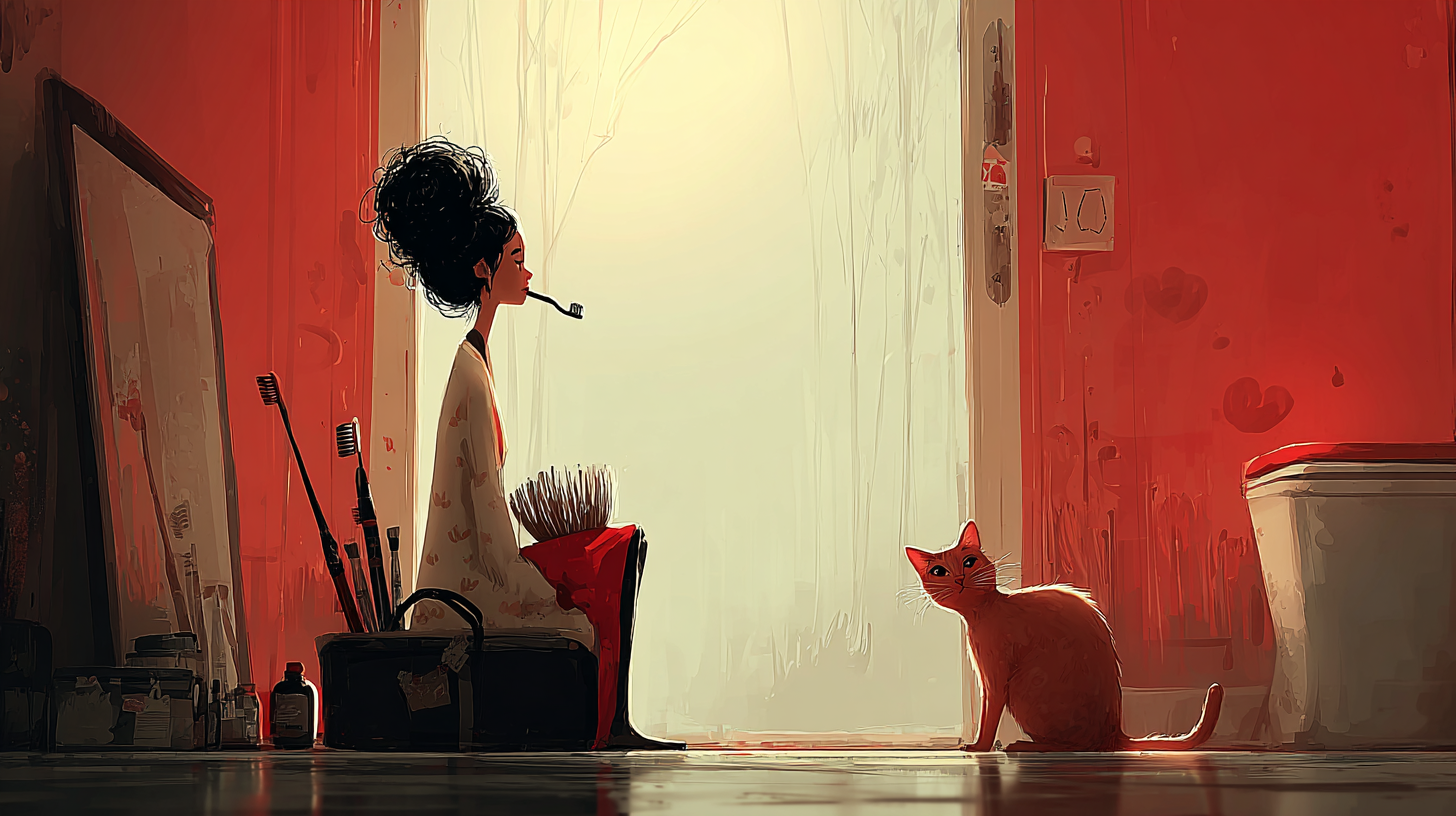“Brush” means to clean or touch something lightly, often with a tool.
「brush」は「ブラシでこする」や「軽く触れる」という意味の言葉。
以下は英単語 “brush” に関するストーリー型学習コンテンツです。まずは大枠の意味を理解して最後の文章で確認しましょう。
主な意味(main meaning)
| 品詞 | 意味 | 発音記号 | 例文 |
|---|---|---|---|
| 名詞 | ブラシ、毛のついた道具 | /brʌʃ/ | I need a new brush for painting. |
| 名詞 | 軽く触れること、接触 | /brʌʃ/ | She felt the brush of his hand on hers. |
| 動詞 | ブラシでこする、みがく | /brʃ/ | He brushes his teeth every morning. |
| 動詞 | 軽く触れる | /brʃ/ | A cat brushed against my leg. |
語源(etymology)
「brush」は中期英語 brushe から来ており、古フランス語「broce」(小枝の束)が語源。もともとは「小枝で作った掃く道具」を指し、「こする・掃く」というイメージに発展。
類義語(synonyms)
| 類義語 | 例文 |
|---|---|
| sweep | She swept the floor with a broom. |
| scrub | He scrubbed the table until it was clean. |
| stroke | She stroked the cat gently. |
| polish | He polished his shoes before the interview. |
反義語(antonyms)
| 反義語 | 例文 |
|---|---|
| ignore | He ignored the dust on the shelf. |
| neglect | She neglected to brush her hair. |
コロケーション(collocations)
| コロケーション | 例文 |
|---|---|
| brush your teeth | Don’t forget to brush your teeth before bed. |
| paint brush | He used a paint brush to color the wall. |
| hair brush | She bought a new hair brush yesterday. |
| brush against | The branches brushed against the window. |
| close brush | I had a close brush with danger yesterday. |
2項表現(binomials)
| 2項表現 | 例文 |
|---|---|
| brush and comb | She packed a brush and comb in her bag. |
| touch and brush | He felt a touch and brush of cold air. |
英語ストーリー(english story)
The Office Brush Incident
One Monday morning, Emily came to the office looking tired. She had rushed out of her apartment and forgotten to brush her teeth. When she sat at her desk, her colleague David noticed something was wrong.
“Rough morning?” David asked.
“Yes,” Emily replied. “I had a close brush with missing the train. I barely made it.”
David smiled and said, “At least you made it. By the way, did you bring the new paint brush for the design project?”
Emily opened her bag and sighed. “I forgot both my toothbrush and the paint brush. I think I need to be more careful.”
During lunch break, Emily went to the store to buy a hair brush and a paint brush. On her way back, she felt something brush against her leg. It was a cat, hiding near the café. She bent down and gave the cat a gentle stroke, remembering how comforting it was to take care of small things.
Later, at the office, she used the new paint brush to finish her work. “Sometimes,” she said to herself, “life just gives you small brushes with trouble. But you can always clean them up.”
和訳
オフィスのブラシ事件
月曜の朝、エミリーは疲れた様子で会社に来た。急いで家を出たため、歯を**brush(みがく)**のを忘れてしまった。デスクに座ると、同僚のデイビッドが異変に気づいた。
「朝、大変だった?」とデイビッド。
「そうなの。電車に乗り遅れるところだったの。まさに**close brush(危うく〜しそうになる)**だったわ。」
デイビッドは笑って言った。「でも間に合ったじゃないか。ところで、デザインプロジェクト用の**paint brush(絵筆)**は持ってきた?」
エミリーはバッグを開けてため息をついた。「歯ブラシも絵筆も忘れちゃった。もっと気をつけなきゃ。」
昼休みにエミリーは店に行き、**hair brush(ヘアブラシ)と絵筆を買った。帰り道、何かが足にbrush against(軽く触れる)のを感じた。カフェのそばに隠れていた猫だった。彼女はしゃがんで猫を優しくstroke(なでる)**した。小さなものを大事にするのは心地よいと感じた。
その後、会社で新しい絵筆を使って仕事を仕上げた。「人生って、ちょっとしたトラブルに**brush(ぶつかる)**こともあるけど、ちゃんと片付けられるのよね」とエミリーはつぶやいた。
Q&A
Q: 「brush」と「sweep」の違いは?
A: 「brush」はブラシのような道具で小さな範囲をこすったり掃いたりするときに使います。一方、「sweep」はほうきやモップで広い範囲を掃くときに使います。
Q: 「brush」と「scrub」の違いは?
A: 「brush」は軽くこする感じで、日常的に歯や髪をきれいにするときなどに使います。「scrub」は力を入れてゴシゴシこするときに使い、床や鍋を強く洗うときに使います。
Q: 「brush」と「stroke」の違いは?
A: 「brush」は軽くこするか、偶然触れるようなときに使います。「stroke」は優しくなでるときに使い、特にペットや髪をなでるイメージです。
Q: 「brush」と「polish」の違いは?
A: 「brush」はブラシでこすってきれいにすることです。「polish」はツヤを出すために磨くことで、靴や家具をピカピカにするイメージです。
Q: 「brush」と「ignore」の違いは?
A: 「brush」は実際にこすったり触れたりする行為を指します。「ignore」は「無視する」という意味で、物理的な動作ではなく気持ちや態度を表します。
Q: 「brush」と「neglect」の違いは?
A: 「brush」は「ブラシで手入れする」という行為です。「neglect」は「怠る」「世話をしない」という意味で、例えば「髪をとかすのを怠る」といった場合に使われます。
Q: 「brush」と「paint brush」の違いは?
A: 「brush」は一般的に「ブラシ」ですが、「paint brush」は絵を描くための専用の筆や刷毛を指します。
Q: 「brush」と「hair brush」の違いは?
A: 「brush」は広い意味でのブラシ全般ですが、「hair brush」は髪をとかす専用のブラシです。
Q: 「brush」と「brush against」の違いは?
A: 「brush」はブラシでこすったり掃いたりすることです。「brush against」は「何かが軽く当たる」という意味で、偶然すれ違うときの感覚を表します。
Q: 「brush」と「close brush」の違いは?
A: 「brush」は物理的に「こする・触れる」という意味です。「close brush」は比喩的に「危うく〜しそうになる」という意味で、危険や失敗をかすめたときに使います。



コメント